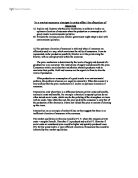Externalities exist when there is a difference between private costs and benefits, and social costs and benefits. For example a chemical company’s prices do not often include social costs, which may be the polluting of the atmosphere or rivers with its waste. More often than not, the price paid by the consumer is only that of the production of the chemicals. It does not include the price to society of cleaning up the rivers.
Externalities are an example of market failure as they suggest that there is an inefficient allocation of resources in the economy.
The market equilibrium in this case would be P1, Y, where the marginal private costs = marginal benefit. Therefore Y is produced and sold at P1. However if social costs are considered price would be higher and quantity produced lower (P2, X) this would lead to a more efficient allocation of resources than would be achieved by free market equilibrium.
In the diagram the marginal social costs are above marginal private costs. This shows the external costs of production in the market, the externality and its cost at different levels of output.
B) There are four main policies used by governments to correct externalities such as environmental pollution.
These are taxes, regulation, the extension of property rights and pollution permits.
With the example of the chemical industry polluting the atmosphere and rivers with its waste products, it was found that the price is too low and quantity produced too high due to the externalities of pollution, to give allocative efficiency.
The use of environmental taxes helps to encourage firms to reduce their pollution levels. Governments aim to tax polluters equally to the value of the social costs of pollution, however it is quite difficult to calculate the correct amount, which a firm needs to pay due to the difficulty in assessing the actual cost to society of the pollution emitted. The government try’s to set the rate of tax so that it is equal to the value of externality. As costs of production to the firm then increase, firms reduce their output to X from Y, and so reduce their pollution emissions.
Environmental taxes allow the market to determine what is produced and how resources are allocated. Producers also have a large incentive to reduce pollution emissions as it would be pointless to produce extra units when any profit made would be taken away by the tax.
Regulation to control externalities is widely used across the world.
The government can set boundaries such as maximum pollution levels which cannot be exceeded or, even completely ban certain emission. E.g. in the U.K there is an Environmental Protection Act of 1989 which sets out standards for emissions from factories in the U.K.
Although regulation is effective at controlling levels of emissions it will only result in greater allocative efficiency if the government is able to correctly asses the costs to society and then match it to the level of pollution allowed.
The extension of property rights is another way in which to deal with externalities and is an alternative to regulation.
For instance, if a factory releases pollution, which causes you to become ill, you would be able to claim compensation. However if the pollution didn’t affect you but killed the trees in your garden it would not be so easy to be compensated for the loss.
However if property rights are extended so it is possible to claim for the damage caused by the company, then it increases their costs so in fact they pay for the true social cost of their pollution.
Extending property rights like this is a way of internalising the externality.
An advantage to extending property rights is that the governments doesn’t have to assess the cost of the pollution, however the problem is that it is very difficult to extend property rights, who should decide who pays? And if the court decides then how do they decide on the correct level of compensation?
Finally the introduction of pollution permits is a policy sometimes adopted by the government.
This is when there is a certain limit set on the amount of pollution allowed. The government then allocates permits to individual firms and polluters, which can be traded between firms who want them.
The main advantage of permits over regulation is that costs are lower to industry and so society, than with regulation. Each firm would also try to reduce their pollution emissions if they knew that they are able to sell on the spare permits and make profit that way.







